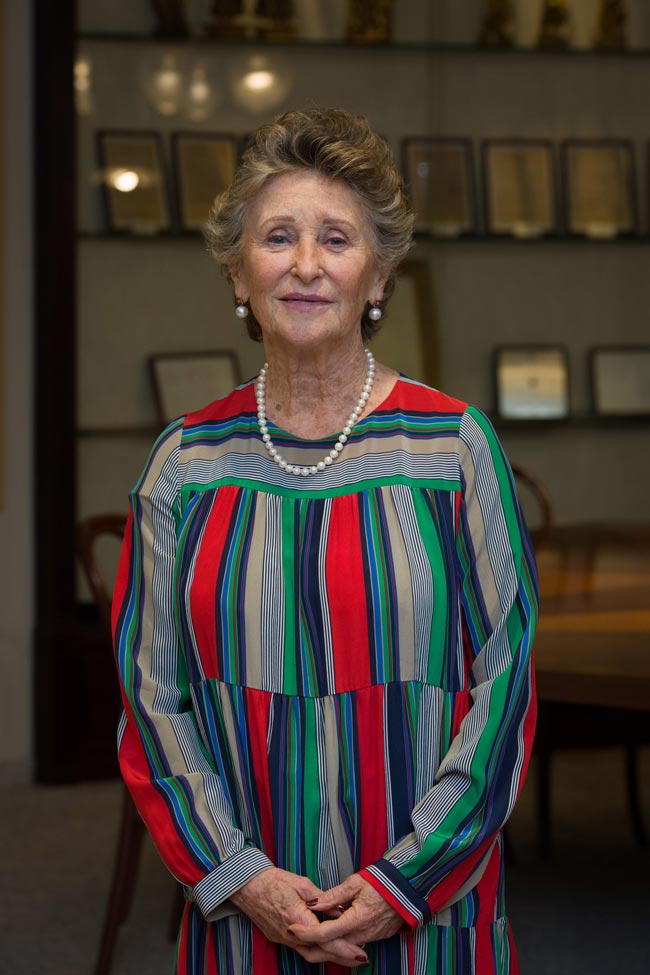Calidoscopi - Mariona Carulla
4. KALEIDOSCOPE
Art and University for critical thinking
Mariona Carulla, president of the Maria Canals Barcelona association
To speak of culture is to speak of education, in the broadest sense of the term. Both are based on learning both technical concepts and humanistic and artistic ones, the very embodiment of the universal man. In today’s society of specialization, the individual must be able to step back from reality and take a broader view of things in order to navigate the changing world with its constant crises with a steadier hand. It is education – especially university education – that must foster these enriching views to cultivate critical thinking, because if we do not know how to think, we cannot rethink. Knowledge makes us free, and when we leave the academy, we must also leave the cave.
Like all levels of education, culture is always ultimately a discovery or even a rediscovery. We see this at Maria Canals each time we put out a piano in public. So many people are encouraged to return to the ivories after years of leaving their sheet music to gather dust. And not only that: the great prize we can offer society is to persuade people who have never touched a piano to play it as a tool for enjoyment, but also for communication and personal fulfilment. Because, as Haydn said, music is the only language the whole world understands. Its sound is so powerful that it envelops us and inevitably challenges us, proposing other ways of viewing reality that are as unique as they are universal.
Like all levels of education, culture is always ultimately a discovery or even a rediscovery

But music is also a discipline requiring commitment, responsibility and method in furtherance of self-expression and excellence, the same things the university pursues. Yet excellence must not be expressed only artistically: culture needs well-founded praxis and efficient methodologies. Today’s artists must be professionals focussed not only on the quality of the artistic result, but also the process of achieving it, which involves good university-trained professionals. This is the only effective way to combat historical amateurism in culture and promote a rigorous understanding of art as a competitive system and, therefore, a tool to refute the eternal question of what real wealth culture generates.
Today’s artists must be professionals focussed not only on the quality of the artistic result, but also the process of achieving it, which involves good university-trained professionals.
The link between art, technique and excellence is apparent at universities with a large number of foreign students, such as UPF or Esade, who go on to enjoy highly successful careers. Interestingly, in these cases, the share of foreign students who play the piano is higher than that of local students. In the more than ten years of the OFF contest, we have been surprised by the number of people who play the piano, with varying levels of skill and in various styles. In the case of universities, this reality is even more pronounced, usually in direct proportion to how demanding the studies are. Putting a piano on campus is thus a way of highlighting the musical and cultural dimension in the university environment, which, although implicitly there, becomes a valuable differentiating factor as soon as the piano is placed in the public forum.
The business world understands this. Companies no longer look for mere executors, but creative talents, capable of innovation and holistic thinking, because when we focus on the concrete, we cannot step back from the context. Complementing university degree programmes in specific fields with an artistic profile grants much more perspective – and boosts employability. Universities can thus fulfil their mission of training well-rounded professionals so that, when they enter the workforce, they are as efficient and socioeconomically important as possible.
But culture, as we understand it, is the sum of all things that foster critical thinking and open-mindedness. Today, love of intellectual knowledge is as important as emotional and sensitive knowledge, with a necessary return to our origins, where individuals were defined in relation to others and to their environment, with a respect for and enjoyment of nature that arose from its contemplation. It is an ancestral voyage that can still seem visionary, because it rescues emotional intelligence and the essentially romantic reconnection with nature from the marginal role to which they have been consigned in a world where the footprint of materialism is encroaching on the physical and spiritual landscape that is so essential to guiding reason when it comes to sparking concern and curiosity about life.
